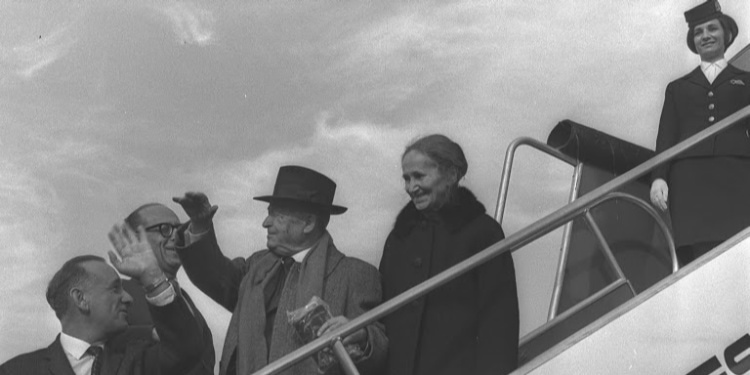Writer Shmuel Yosef Agnon: Composing Songs in Writing
The Fellowship | July 16, 2020

Born on Tisha B’Av
Born to a Jewish family in Buchach, Ukraine, Shmuel Yosef Agnon always claimed his birthday as Tisha B’Av, the Jewish fast day on the ninth of Av. Schooled by his parents – his father an ordained rabbi – and writing in Hebrew and Yiddish by the age of eight, and Agnon published his first poem at fifteen.
He made aliyah (immigrated to the Holy Land) in 1908, moving to Jaffa, where he continued to publish his writing. After moving to Germany five years later, Agnon met his wife Esther. They remained married for fifty years until his death. After a 1924 house fire in destroyed Agnon’s manuscripts and rare books, the couple returned to the Jerusalem.
A Unique Writer
Mostly influenced by Bible stories, Agnon’s writing dealt with Jewish life from his own unique perspective. Many of the words and phrases he made up have become part of the modern Hebrew language.
To this day studied and beloved in Israel, Agnon and his writing received praise during his lifetime, as well. He won the Bialik Prize for Literature in 1934 and 1950, along with the Israel Prize in 1954 and 1958. In 1966, Agnon received the Nobel Prize in Literature, “for his profoundly characteristic narrative art with motifs from the life of the Jewish people.”
A Nobel Laureate
In his Nobel acceptance speech, this artist who represented the Jewish people and Jewish state commented on the gift from God he used during his long and prolific career:
As a result of the historic catastrophe in which Titus of Rome destroyed Jerusalem and Israel was exiled from its land, I was born in one of the cities of the Exile. But always I regarded myself as one who was born in Jerusalem. In a dream, in a vision of the night, I saw myself standing with my brother-Levites in the Holy Temple, singing with them the songs of David, King of Israel, melodies such as no ear has heard since the day our city was destroyed and its people went into exile. I suspect that the angels in charge of the Shrine of Music, fearful lest I sing in wakefulness what I had sung in dream, made me forget by day what I had sung at night; for if my brethren, the sons of my people, were to hear, they would be unable to bear their grief over the happiness they have lost. To console me for having prevented me from singing with my mouth, they enable me to compose songs in writing…
